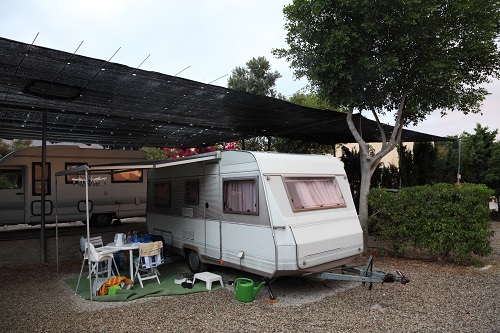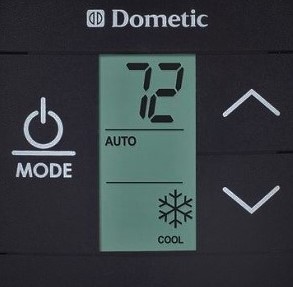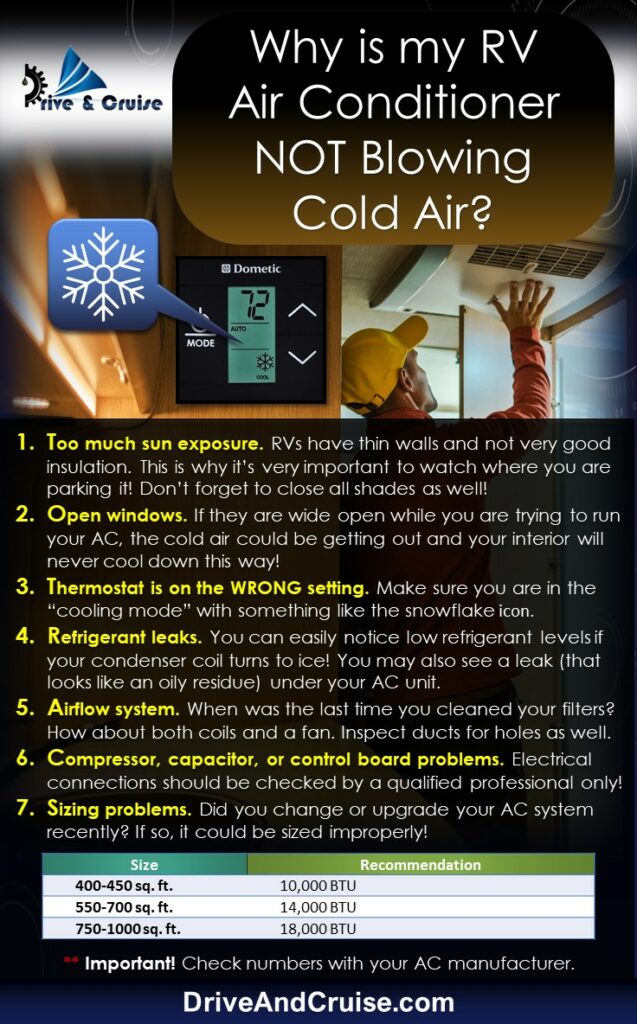![]()
Why is my RV Air Conditioner NOT Blowing Cold Air?
DISCLAIMER: AS AN AMAZON ASSOCIATE I EARN FROM QUALIFYING PURCHASES. THIS POST CONTAINS AFFILIATE LINKS THAT WILL REWARD ME MONETARILY OR OTHERWISE WHEN YOU USE THEM TO MAKE QUALIFYING PURCHASES. FOR MORE INFORMATION, PLEASE READ MY EARNINGS DISCLAIMER.
|
What a bummer! You are ready to go on the long-awaited beach trip with your family, but your AC unit after test running for at least an hour just does not cooperate… Is your air conditioning not blowing cold air or it is unable to cool down your camper?
The number one reason why the RV air conditioner may not be blowing cold air is that the air filters are clogged. If the AC unit has been cleaned properly and it still gives you problems, a professional can check your wiring and internal components for faults.
RVs have thin walls and not very good insulation. This is why it’s very important to watch where you are parking it! With the sun “baking” your camper all day long, it may get really hot inside and an air conditioner will simply have trouble getting all the heat out.
Also, you didn’t forget to close your windows, did you?
If they are wide open while you are trying to run your AC, the cold air could be getting out and your interior will NOT cool down this way! You will NEVER cool down RV (or any room) if your windows are wide open.
The insulation of windows is even thinner than walls and their temperature can skyrocket! Pulling a shade over your windows is generally recommended before turning the AC on, especially if they are on the sunny side.
Moving your RV into the shade of trees, for example, and therefore getting rid of the constant heat supply could solve your problem (assuming that you are not parked in the desert). In your own parking space, a man-made tent above should do the trick:

Also, if the day is especially humid, do NOT set your AC down too low (right away) to avoid creating too much condensation. Set it to a temperature about 15 degrees less than inside air right now and let it gradually handle the humidity situation.
In the situation where everything was working fine and all of a sudden you are not getting cold air anymore, you could have someone playing with your thermostat thinking it was a toy! So, before you start doing more complicated tests on your AC, you may want to check on that.
You could also have your RV thermostat in the WRONG setting! Make sure you are in the “cooling mode” with something like the snowflake icon and NOT in the heating mode:

Now let’s troubleshoot your Camper or RV ac unit and find out why it’s not blowing cold air. Following are the most common sections where air conditioning cooling problems occur:
- Airflow system.
- Compressor
- Refrigerant
** Very important! Before doing ANY work on your AC unit, make sure that it’s fully disconnected from the electricity source. You can do so by either flipping appropriate switches, removing fuses, or completely disconnecting from the power source or the generator. Don’t forget the battery switch!
Airflow system troubleshooting
The airflow system is probably the easiest one to check and this is why I will talk about it first. Your air conditioner needs adequate airflow to function properly and if any of the following elements are clogged or damaged (seals are worn out), you will have a problem.
These important elements need to be checked for proper circulation of air:
- Air filter
- Evaporator coil
- Condenser coil
- Fan Blower
- Ducts
1. Air filters
When was the last time you cleaned the filters in your air conditioner? If you are not sure how to access them, here is a video on that:
You can clean a regular foam filter with soapy water or buy a disposable version. If your AC is used heavily, vacuuming filters at least once a week is recommended.
Old or broken filters will not do their job properly and need to be replaced. Clogged air filters could also be a cause of evaporator coils freezing up!
2. Evaporator coils
After you take the filter down, the evaporator coils should be exposed. If you can reach them, they can be cleaned gently with a brush.
You can also access the coils from the top of your camper. After removing the main AC housing you will need to remove a metal sheet that covers them.
Evaporator coils are often ignored and not cleaned, but that could be easily done with a vacuum cleaner:
3. Condenser coils & fan
Condenser fins can have all kinds of stuff in them! It can be covered with anything from spider webs to leaves and dead wasps! Here is some good information on rinsing and maintaining your condenser coils and a fan:
4. Ducts
Sometimes, the cool air would escape through the roof due to worn-out factory seals or other holes previously unnoticed. All you have to do is to find where cold air is escaping and patch those holes with aluminum foil tape.
Feel free to save the infoPin below for your future Reference :Other problems
Compressor
Electrical troubleshooting of your AC should be checked by a qualified professional, but if you think you are up to the task, you should get yourself a multimeter.
This is a video on how to check your compressor, capacitor, and control board:
If all the connections are delivering accurate voltage and your capacitor is in good shape, then the problem could be a lack of refrigerant.
Refrigerant
You can easily notice low refrigerant levels if your condenser coil turns to ice! Also, if you see a leak (that looks like an oily residue) under your AC unit, that’s a sure sign that the lack of refrigerant is a problem with your cooling system.
RV AC systems are not designed to be recharged and you may need to get a new air conditioner.
A/C sizing
There also could be a problem with the sizing of your AC unit. Did you change or upgrade your AC system recently? Just so you know, it could be sized improperly!
If your AC is working well but not be powerful enough to cool your RV down, it means that you’ve got a smaller unit than your RV or camper requires.
The higher the BTU rating of your air conditioner is, the more power it has. Check your papers for BTU output and compare them to the following chart:
| Size | Recommendation |
| 400-450 sq. ft. | 10,000 BTU |
| 550-700 sq. ft. | 14,000 BTU |
| 750-1000 sq. ft. | 18,000 BTU |
** Important! These numbers are approximate and I listed them just to give you an idea. Before making a decision, check with the AC manufacturer or RV specialist.

You can also search our database:
Attention! This article is for informational purposes ONLY and is NOT a replacement for professional advice! ALWAYS consult your local specialist for an appropriate solution to your problem. All statements, prices, contact information, recommendations, and reviews contained herein came from sources that we believe to be reliable, but the accuracy or completeness thereof is not guaranteed. Please contact the service provider for complete details and updates.



